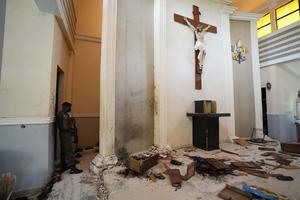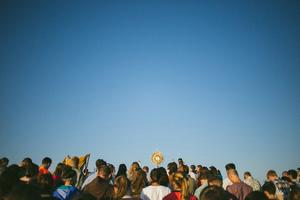We Must Not Forget Nigeria!
A NOTE FROM THE PUBLISHER: Violence against Christians is almost a daily occurrence.

The June 5 slaughter of dozens of innocent Nigerian Catholics at a Pentecost Mass in Owo, in the southwestern state of Ondo, was an utterly horrific tragedy. Even more tragic is the reality that this wasn’t an isolated event; violent attacks against Christians are commonplace in Nigeria. The tragedy is compounded even further by the reality that the rest of the world has mostly ignored the escalating anti-Christian persecution that for decades has been underway in Africa’s most populous nation.
Violence there against Christians is now a daily occurrence. In just the last month, along with the devastating Pentecost massacre, the reported attacks included the May 26 kidnapping of two priests in the Diocese of Sokota; the death of another priest who was kidnapped in March; and the murder of a Christian college student by a mob of her fellow students.
The perpetrators of the attacks on Christians include a number of Islamist groups, including most notably the infamous Boko Haram militants, who have conducted numerous outrages in Nigeria’s north, and the Muslim Fulani militia, who have targeted their victims throughout a broader geographic swath of the country. The violence is not exclusively inspired by anti-Christian antipathies; ethnic, economic and territorial rivalries are also in play, particularly in the case of the Fulani.
But religion remains very much the driver of the violence in Nigeria, whose population of 225 million is almost equally split between Muslims and Christians. According to both the U.S. Commission on International Religious Freedom and the “World Watch List” of the Open Doors advocacy organization, Nigeria is one of the world’s most egregious offenders in terms of religious persecution.
The consequences for Nigerian Christians have been dire. More than 60,000 Christians have been killed over the past two decades, and the death toll has spiked alarmingly recently, with one report estimating that more than 3,400 Christians were killed in the first 200 days of 2021.
It’s also clear that even though they constitute nearly half of their nation’s total population, the African nation’s beleaguered Christian community can’t count on help from the current government. President Muhammadu Buhari is an ethnic Fulani himself, and his government’s national security apparatus is dominated by officials whose sympathies appear to lie more with the perpetrators of religious violence than its victims.
This deplorable failure by public authorities to act on their behalf was singled out in the June 7 statement by the Diocese of Ondo regarding the Pentecost Sunday massacre at St. Francis Xavier Church in Owo.
Calling for the perpetrators of “this abominable act” to be brought immediately to justice, the statement commented, “It is quite disheartening and embarrassing that these unnecessary killings, kidnappings and other atrocities are now done with impunity on [a] daily basis.”
Outside of Nigeria, with the war in Ukraine continuing to dominate international news and so many tragedies occurring closer to home, such as the recent mass shootings in the United States, people have been distracted from the worsening violence in Nigeria and the Christian persecution taking place there. So what should Catholics in the United States do to communicate solidarity with our brethren in faith in Nigeria and provide them with concrete support?
According to Catholic religious-freedom advocates like the Religious Freedom Institute’s Stephen Rasche, one immediate action should be to press our own national government to reinstate Nigeria’s official designation as a “country of particular concern” with respect to the country’s violation of its citizens’ religious freedom. Despite the continuing surge in violence against Christians, and the obvious unwillingness of the current Nigerian regime to take meaningful steps to curb it, the U.S. State Department moved last November to remove Nigeria from its list of “Countries of Particular Concern” that are committing the most egregious violations against religious freedom.
This unexpected action, which runs directly contrary to the continuing escalation on the ground, stunned religious-freedom advocates. In fact, the U.S. Commission on International Religious Freedom, a bipartisan federal panel whose members are appointed by both the White House and Congress, released a statement declaring that it was “appalled” by the State Department’s action.
This shift by the Biden administration regarding Nigeria appears reflective of the tendency of many Western political leaders to downplay violence directed specifically against Christians and to decline to act meaningfully against nations that allow it to occur — even though it’s documented fact that Christians are far and away the most common targets of international religious-liberty violations. Whatever the motive, it was a serious mistake by the State Department that needs to be corrected at the earliest opportunity. The administration should also communicate that U.S. development aid to Nigeria, including the $2.1-billion package announced by Secretary of State Antony Blinken two days after the revocation of Nigeria’s designation as a country of particular concern, will be made available only on the explicit condition that its national government upholds religious freedom and defends its Christian citizens from the continuing epidemic of violence.
We must also continue to offer our prayers for the Christian people of Nigeria and persecuted Christians around the world. In addition, we can also contribute directly to international religious advocacy organizations and to aid efforts for victims. Such aid is desperately needed in the wake of attacks such as the Pentecost Mass massacre.
But as we strive to assist Nigeria’s beleaguered Catholics, let us also keep in mind that they are doing as much or more for us in return. Despite their unending sufferings, their joy and perseverance as followers of Christ is truly remarkable. Undeterred by the attacks on their churches, weekly Mass attendance among local Catholics remains upwards of 90%, and vocations to the priesthood and religious life continue to grow. These faithful know that heaven exists, and like the early Christian martyrs, they are willing to die for their faith if necessary. We should thank God for their heroic witness and through it gain the strength to draw closer to him ourselves.
God bless you!
- Keywords:
- michael warsaw
- nigeria
- violence in nigeria against christians
- christian persecution
- publisher's note














